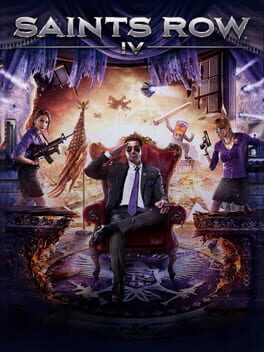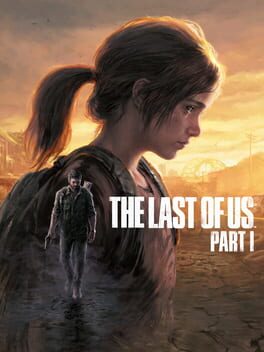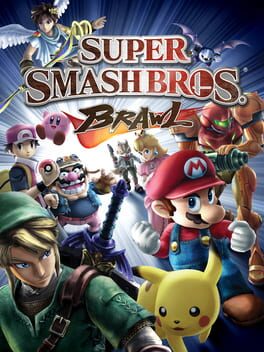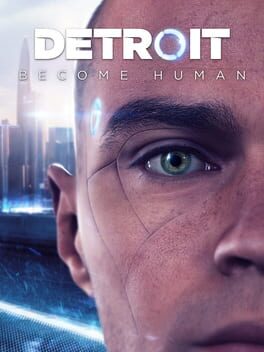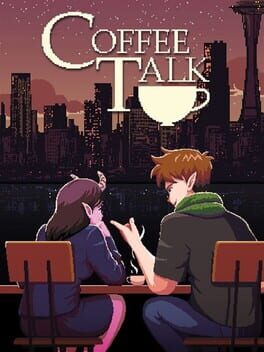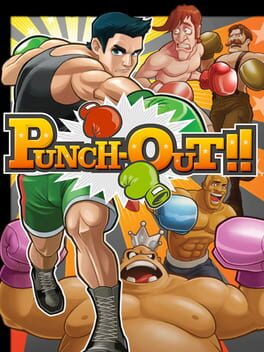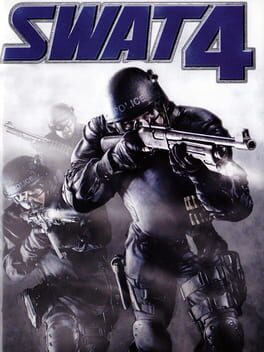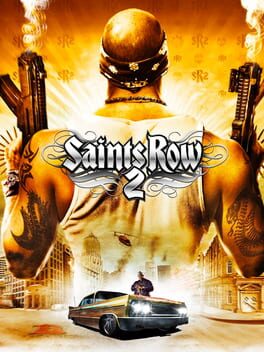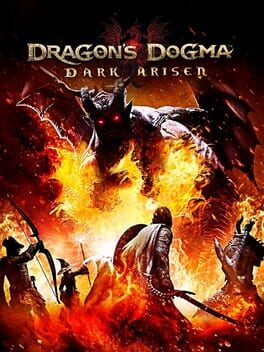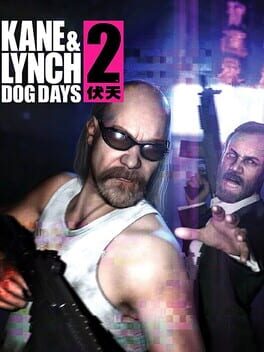DKMarioKart
17 Reviews liked by DKMarioKart
Saints Row IV
2013
Drakengard
2003
Coffee Talk
2020
" What if I made a fantasy world where all fantasy races lived in peace "
Me: 🙂🙂🙂
" And then you had a comfy coffee shop with a diverse cast of costumers "
Me: 😄😄😄
" But the world was filled with prejudice and xenophobia "
Me: 😓😓😓
" And they used memes to describe structural racism "
Me: 😞😞😞
" And orcs are like... black people! "
Me: 😔😔😔
Me: 🙂🙂🙂
" And then you had a comfy coffee shop with a diverse cast of costumers "
Me: 😄😄😄
" But the world was filled with prejudice and xenophobia "
Me: 😓😓😓
" And they used memes to describe structural racism "
Me: 😞😞😞
" And orcs are like... black people! "
Me: 😔😔😔
Punch-Out!!
2009
SWAT 4
2005
Saints Row 2
2008
Shenmue
1999
“Years ago, I was Chinese”
It’s universally true that every American has dreamt of being an autistic Japanese dock worker. Now, you can make that dream come true!
On a serious note, Majora’s Mask was the perfect primer for me to get into Shenmue. This famously immersive Dreamcast epic/Virtua Fighter RPG is beyond ambitious, and it’s proof that game design going deep can be way better than going wide.
It’s the wonderfully aimless predecessor to games like LA Noire and Yakuza. It’s part mystery, part fighting game, part life-sim, but honestly with none of the headache that comes with any of them. You don’t have to bathe or comb your hair like in Red Dead Redemption 2, and there’s no real hurry to finish the campaign, so you can play darts and Space Harrier to your heart’s content.
Some call it boring, but I found Shenmue to be a soothing, fulfilling experience. It makes me sad that we don’t see tons of games like it nowadays. Companies have gone for these expansive/empty open worlds for so long that aside from a few (including aforementioned games) we’ve missed out on a level of granular detail that they were able to achieve on the Sega Dreamcast. Plus you can carry over your save file Mass Effect-style to the next game! Insane!
We need more games like Shenmue.
It’s universally true that every American has dreamt of being an autistic Japanese dock worker. Now, you can make that dream come true!
On a serious note, Majora’s Mask was the perfect primer for me to get into Shenmue. This famously immersive Dreamcast epic/Virtua Fighter RPG is beyond ambitious, and it’s proof that game design going deep can be way better than going wide.
It’s the wonderfully aimless predecessor to games like LA Noire and Yakuza. It’s part mystery, part fighting game, part life-sim, but honestly with none of the headache that comes with any of them. You don’t have to bathe or comb your hair like in Red Dead Redemption 2, and there’s no real hurry to finish the campaign, so you can play darts and Space Harrier to your heart’s content.
Some call it boring, but I found Shenmue to be a soothing, fulfilling experience. It makes me sad that we don’t see tons of games like it nowadays. Companies have gone for these expansive/empty open worlds for so long that aside from a few (including aforementioned games) we’ve missed out on a level of granular detail that they were able to achieve on the Sega Dreamcast. Plus you can carry over your save file Mass Effect-style to the next game! Insane!
We need more games like Shenmue.
Since time immemorial, through the foggy shroud of that unknown place we call the past, since man first airbrushed Gandalf smoking a pipe on the side of a van, there has been, floating in the aetheric vapor of the noosphere, a dimly illuminated dream, The Dream, pinpricks of the sublime in the collective mind of humanity. Some have glimpsed a piece of this dream- The Legend of Zelda, The Elder Scrolls, Ultima, Dark Souls, Adventure, Dragon Quest, King's Field, Wizardry, and countless others, but each in turn have failed to capture The Dream. Perhaps they could not escape their worldly fetters and feared the purity and power of The Dream, perhaps they, like in the parable of the Blind Men and the Elephant, only beheld some small part of The Dream, perhaps they greedily sought to pass off The Dream as their own. Whatever the case may be, the results have always been, like Conrad Gessner's illustration of the Cameleopard, a grotesque, a parody, and an imitation. Dragon's Dogma is The Dream, carved in the fullest relief yet, and lit by warm radiance, it is not artistically generic- it is pure, it is not unfinished- it is too great to exist in totality on this fallen Earth, it is videogames: fulfilled, it is proof that the creative endeavors of humankind are not wasted, it is the twinkle in the eye of Gandalf smoking a pipe airbrushed on the side of a van.
Saints Row 2
2008
I am fully aware how ridiculous this may sound, but I am being 100% serious when I tell you that this game's cutscenes, seemingly driven mostly by "hm, what would look the coolest here?", are better—and more thoughtfully—shot and edited than most other games I've played.
"But what about [prestige game]" especially better than that.
Despite the average shot length being too short for my taste, the cutscene where the Ronin attempt to ambush Johnny Gat and the player was when I realized "oh, someone DIRECTED this." Beyond the flashier stuff like the derivative-but-still-great katana flower-cutting discretion shot, there's a real sense of rhythm to the scene and thoughtfulness to the blocking (to say nothing of the physical comedy) that persists across all the other story cutscenes, once I started paying attention.
(Of particular note is the long take late in the Brotherhood arc, which I bring up not because long takes are inherently good or something—they're frequently misused pretentiously by people who don't understand what they're for—but because it's specifically there to create a vulnerable, scrambling feeling that underlines both the larger theme of the arc of powerful people feeling powerless and lashing out in petty destructive ways, and the immediate theme of Maero Is Bigger And Stronger Than Me Oh No.)
The fact that these cutscenes come out of an era in gaming that was still pretty dominated by "just vaguely point the camera at the action" is nuts.
Oh also the rest of the game's alright. It's extremely 2008 in good and bad ways. It's better than the HD GTAs by a country mile. It's hard for me not to compare its controls negatively to its sequel, since I played it first—jumping on cars to get in them without the animation is a salve, but doesn't compare to jumping directly into the driver's seat in SRTT—but obviously the tradeoff is that Stilwater is a better sandbox than Steelport.
(p.s. the female player character is sorta-canonically trans, which is fun)
"But what about [prestige game]" especially better than that.
Despite the average shot length being too short for my taste, the cutscene where the Ronin attempt to ambush Johnny Gat and the player was when I realized "oh, someone DIRECTED this." Beyond the flashier stuff like the derivative-but-still-great katana flower-cutting discretion shot, there's a real sense of rhythm to the scene and thoughtfulness to the blocking (to say nothing of the physical comedy) that persists across all the other story cutscenes, once I started paying attention.
(Of particular note is the long take late in the Brotherhood arc, which I bring up not because long takes are inherently good or something—they're frequently misused pretentiously by people who don't understand what they're for—but because it's specifically there to create a vulnerable, scrambling feeling that underlines both the larger theme of the arc of powerful people feeling powerless and lashing out in petty destructive ways, and the immediate theme of Maero Is Bigger And Stronger Than Me Oh No.)
The fact that these cutscenes come out of an era in gaming that was still pretty dominated by "just vaguely point the camera at the action" is nuts.
Oh also the rest of the game's alright. It's extremely 2008 in good and bad ways. It's better than the HD GTAs by a country mile. It's hard for me not to compare its controls negatively to its sequel, since I played it first—jumping on cars to get in them without the animation is a salve, but doesn't compare to jumping directly into the driver's seat in SRTT—but obviously the tradeoff is that Stilwater is a better sandbox than Steelport.
(p.s. the female player character is sorta-canonically trans, which is fun)
Fallout: New Vegas
2010
In twenty or thirty years, if the world's still around by then, I strongly suspect that Bethesda RPGs will exist in that particular space where those of us who lived through them insist to a skeptical audience of video game history enthusiasts how important they were. "You have to understand," we'll say, "I know they're unbelievably glitchy and they play like a bicycle with hexagonal wheels, but these were huge. EVERYONE played these." For all their flaws, these games defined a particular ideal of gaming experience not so much by what they were as by what they aspired (and inevitably failed) to be.
Of course, New Vegas isn't a Bethesda game. It was developed by Obsidian Entertainment and it has a distinctly different design sensibility. At the same time, it clearly is a Bethesda game: the expectations created by Fallout 3 and the constraints imposed by the engine itself make the moment-to-moment experience of playing much more alike its siblings than it is different. And so it exists in the liminal space of the cover artist, stuck with a song but still given the freedom to put their own spin on it.
New Vegas's spin is grand political struggle. Although other Bethesda games have their obligatory world-altering main quests, none extend so deeply through the vast game world or make it seem so much like a real place where real people are struggling with and against one another to make the best of a bad situation. The way it seeks to breathe life into the Mojave Wasteland is the heart of what sets New Vegas apart. Proper Bethesda games grasp desperately at an ideal of "realism" defined by interactive stuff: in the real world you go anywhere, talk to anyone, and touch anything you see, so the most realistic games must be huge maps littered with stuff you can pick up and people who will talk to you about arrows and knees.
My friend Bret and I call this approach "lumpy realism", after the mountain of discrete objects it engenders. And while New Vegas is beholden to lumpiness, it's mostly a trapping of its ancestry. It's more interested in what I'll call "decisive realism", the promise that the choices you make as a player matter in some deep sense. This is still an ideal whose shortcomings will always show the seams of artificiality, but it's also one that makes space for writing and plotting, the unsung heroes of the RPG genre.
For my money though, the most interesting thing about New Vegas is less what it tries to do and more the negative space left behind by what it doesn't try to do. Because it's less interested in leaving interactive stuff all over the place (and possibly because of development time constraints), it has a number of places that just exist. They're not part of a quest, they don't have lore, they're not meaningfully interactive in any way. They're just spaces and models and textures that exist for you to be near and look at. That's a sort of realism too, even if it's not intentional. After all, even though I could interact with anything in the world, in reality, I usually choose to just take it in.
Of course, New Vegas isn't a Bethesda game. It was developed by Obsidian Entertainment and it has a distinctly different design sensibility. At the same time, it clearly is a Bethesda game: the expectations created by Fallout 3 and the constraints imposed by the engine itself make the moment-to-moment experience of playing much more alike its siblings than it is different. And so it exists in the liminal space of the cover artist, stuck with a song but still given the freedom to put their own spin on it.
New Vegas's spin is grand political struggle. Although other Bethesda games have their obligatory world-altering main quests, none extend so deeply through the vast game world or make it seem so much like a real place where real people are struggling with and against one another to make the best of a bad situation. The way it seeks to breathe life into the Mojave Wasteland is the heart of what sets New Vegas apart. Proper Bethesda games grasp desperately at an ideal of "realism" defined by interactive stuff: in the real world you go anywhere, talk to anyone, and touch anything you see, so the most realistic games must be huge maps littered with stuff you can pick up and people who will talk to you about arrows and knees.
My friend Bret and I call this approach "lumpy realism", after the mountain of discrete objects it engenders. And while New Vegas is beholden to lumpiness, it's mostly a trapping of its ancestry. It's more interested in what I'll call "decisive realism", the promise that the choices you make as a player matter in some deep sense. This is still an ideal whose shortcomings will always show the seams of artificiality, but it's also one that makes space for writing and plotting, the unsung heroes of the RPG genre.
For my money though, the most interesting thing about New Vegas is less what it tries to do and more the negative space left behind by what it doesn't try to do. Because it's less interested in leaving interactive stuff all over the place (and possibly because of development time constraints), it has a number of places that just exist. They're not part of a quest, they don't have lore, they're not meaningfully interactive in any way. They're just spaces and models and textures that exist for you to be near and look at. That's a sort of realism too, even if it's not intentional. After all, even though I could interact with anything in the world, in reality, I usually choose to just take it in.
There’s not much room for prickly games in the modern gaming landscape, because abrasions hemorrhage cash. Companies and consumers hold fast to the familiar, but I have little sympathy for those who hide away in aesthetic bunkers.
Games like this are an all-out assault on the foxholes of the picky children.
An ugliness pervades Kane & Lynch 2: Dog Days, but it was an intentional aesthetic decision, and one that has imbued it with a specific kind of timelessness not enjoyed by its contemporaries. There’s reason to believe a remaster would potentially ruin the alchemy behind its very being.
This game’s not about redemption. It’s not about friendship. It’s not about a higher purpose. It’s about shaky, noisy, low bitrate dv footage of two fully naked men covered in bleeding cuts massacring their way through the bootleg dvd stores of Shanghai.
Kane & Lynch 2 is a laser-focused four-hour experience, but you’ll probably make a decision on its merits within the first four seconds of gameplay. I was all in. It’s divisive, and while disliking it is understandable, dismissing it is wholly undeserved. After all these years I still haven’t played anything like it.
Anyway what do you think the chances are of us getting a Kane & Lynch 3?
Edit: I did not intend for this review to denigrate or delegitimize people who dislike this game. I don’t feel like I should delete the review, but I don’t want people to get the impression that disliking this game means you just “don’t get it” or something, or that I am extra enlightened because I fell in love with the blurry Michael Mann game.
I stand by my subjective belief that this game is a phenomenal work of art, but it is a flawed game. Every game is flawed, and people can rightly criticize those flaws. For me, the pros outweigh the cons. For others, they don’t. Is it just offensive? Is it all style, no substance? I’d like to think it’s something more than that; a commentary of sorts. A strange one that has a little bit of its cake and eats it, too, but in a way I think actually works.
This review is not a reappraisal because I have always liked this game; I didn’t ‘come around’ on it. That said, not everyone who hated it at the time (or now) is some kind of backwards puritan, and it’s wrong and in bad faith to assume that. But dawg you know a game is divisive when the review distribution is almost a flat line. Anyway this game doesn’t need to be a battleground and I’m sorry, I think I made it worse. Let’s just go back to loving Ecco the Dolphin, as we all do without question.
Games like this are an all-out assault on the foxholes of the picky children.
An ugliness pervades Kane & Lynch 2: Dog Days, but it was an intentional aesthetic decision, and one that has imbued it with a specific kind of timelessness not enjoyed by its contemporaries. There’s reason to believe a remaster would potentially ruin the alchemy behind its very being.
This game’s not about redemption. It’s not about friendship. It’s not about a higher purpose. It’s about shaky, noisy, low bitrate dv footage of two fully naked men covered in bleeding cuts massacring their way through the bootleg dvd stores of Shanghai.
Kane & Lynch 2 is a laser-focused four-hour experience, but you’ll probably make a decision on its merits within the first four seconds of gameplay. I was all in. It’s divisive, and while disliking it is understandable, dismissing it is wholly undeserved. After all these years I still haven’t played anything like it.
Anyway what do you think the chances are of us getting a Kane & Lynch 3?
Edit: I did not intend for this review to denigrate or delegitimize people who dislike this game. I don’t feel like I should delete the review, but I don’t want people to get the impression that disliking this game means you just “don’t get it” or something, or that I am extra enlightened because I fell in love with the blurry Michael Mann game.
I stand by my subjective belief that this game is a phenomenal work of art, but it is a flawed game. Every game is flawed, and people can rightly criticize those flaws. For me, the pros outweigh the cons. For others, they don’t. Is it just offensive? Is it all style, no substance? I’d like to think it’s something more than that; a commentary of sorts. A strange one that has a little bit of its cake and eats it, too, but in a way I think actually works.
This review is not a reappraisal because I have always liked this game; I didn’t ‘come around’ on it. That said, not everyone who hated it at the time (or now) is some kind of backwards puritan, and it’s wrong and in bad faith to assume that. But dawg you know a game is divisive when the review distribution is almost a flat line. Anyway this game doesn’t need to be a battleground and I’m sorry, I think I made it worse. Let’s just go back to loving Ecco the Dolphin, as we all do without question.
